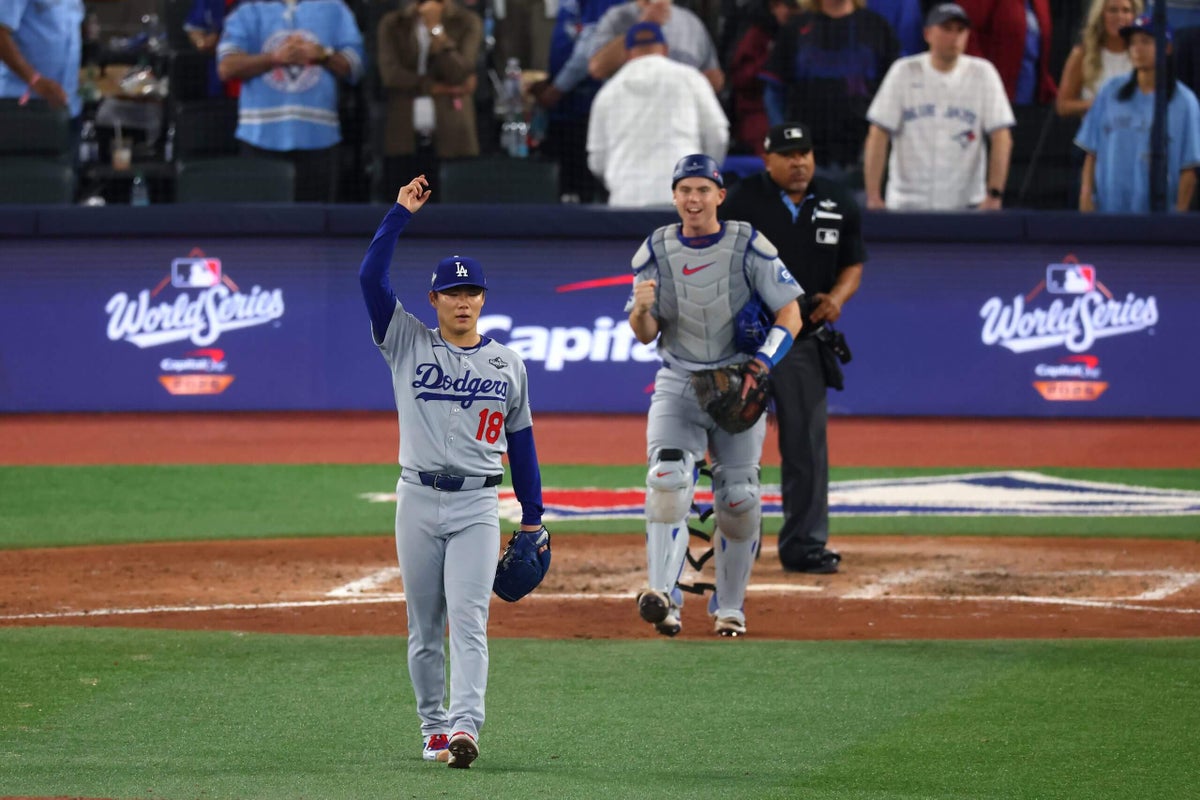TORONTO — Their starting pitcher (Yoshinobu Yamamoto) had an Orel Hershiser moment. Their starting catcher (Will Smith) had a Roy Campanella moment. And their team — baseball’s reigning champs, the Dodgers — had another evening like so many we’ve seen over the last two Octobers.
The scoreboard told one story Saturday night: Dodgers 5, Blue Jays 1, in Game 2 of the 2025 World Series. But here at the World Series offices of the Weird and Wild column, we’d like to tell another story. A bigger-picture kind of story. Because that big picture is so clearly within sight now.
Let’s do that math. It’s now one win down — and three wins to go. But in the case of this group of Dodgers, one plus three does not just equal four. Not right now. Because this isn’t Mrs. McGillicuddy’s first-grade arithmetic class. This is the World Series.
So for this Dodgers team, at this particular moment in baseball time, one plus three would equal history.
It is the rare kind of history only teams that win back-to-back World Series can make. And after their Series-evening Game 2 win, these Dodgers are close enough to taste it.
They’re just not quite close enough to fully comprehend it.
“Just to win once is hard,” their first baseman, Freddie Freeman, said. “So now to be this close to being able to do it two times in a row, I don’t know if I’ve really grasped the weight of it. That’s just because we’re so in it and just trying to win, and not really thinking about history and all that kind of stuff.
“But I think when you do take a step back,” Freeman said, “and realize the opportunity that’s here and presented to us, it’s pretty cool.”
Oh, it’s very, very cool, all right. He just has no idea how cool. And based on my conversations this month with many of his teammates, none of them have a real feel yet for what they have a chance to accomplish if they can just win three more games in this World Series.
So that’s where we come in. We can try to help them grasp it. We can try to help all of you grasp it. It is bigger than people are making it out to be. Which is saying something because Dodgers trying to repeat was already one of the defining storylines of this World Series.
But it’s so much more powerful than many understand. So let’s tell you why.
It’s not just about the 1998-1999-2000 Yankees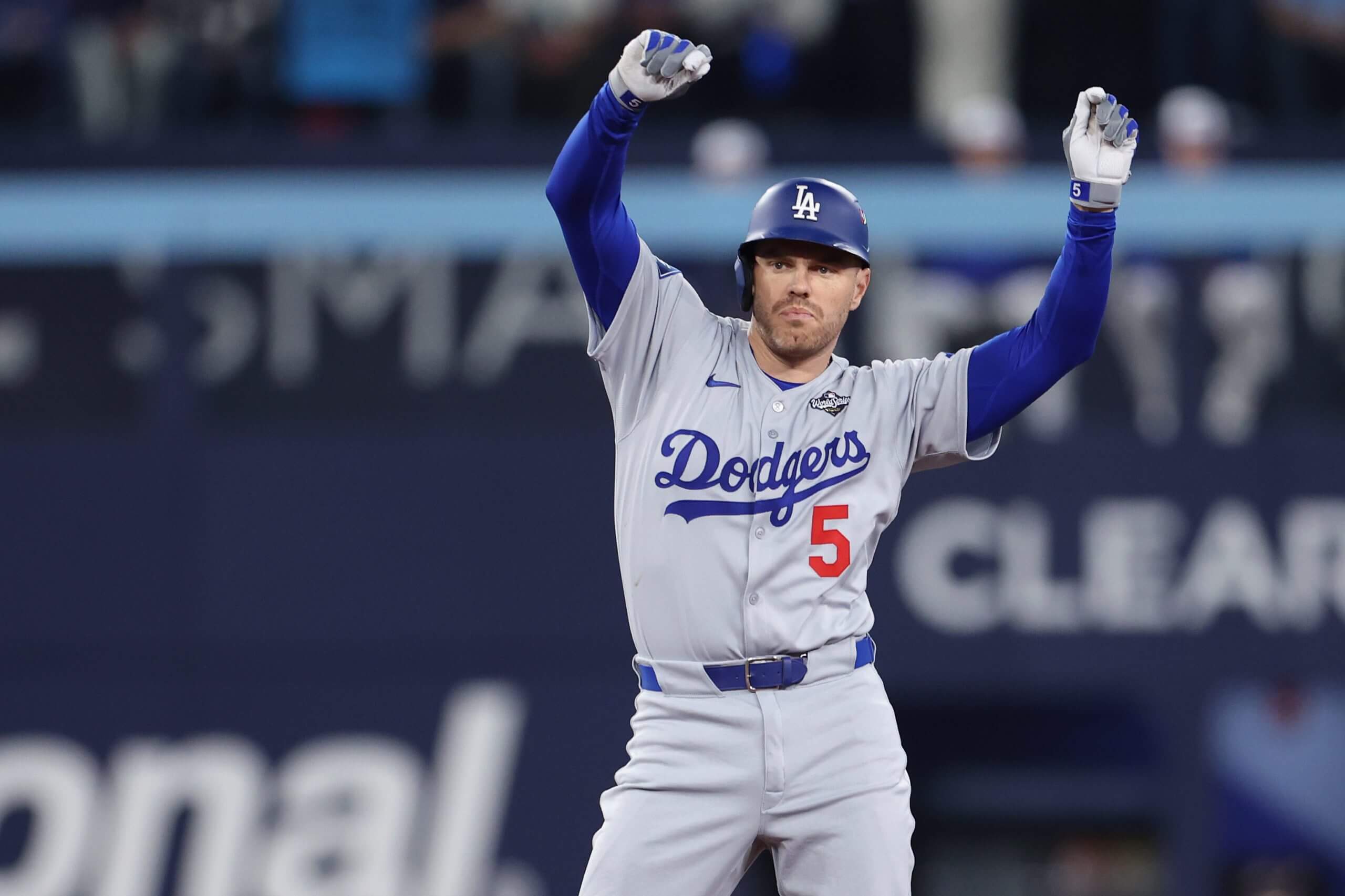
“Just to win once is hard,” Freddie Freeman said. “So now to be this close to being able to do it two times in a row, I don’t know if I’ve really grasped the weight of it. (Emilee Chinn / Getty Images)
Twenty-five years is a long time — in baseball and in life. We’re not here to minimize everyone’s favorite factoid — that this Dodgers team could become the first to win back-to-back World Series since Derek Jeter’s 1998-1999-2000 Yankees.
That’s amazing in and of itself. But if that’s all you know about the Dodgers’ quest to repeat, you don’t know the half of it.
Here’s that half. And it’s staggering.
What league do the Dodgers play in? Right, the National League. And when I asked these Dodgers if they knew much about how rare it is for an NL team to win back-to-back World Series, they gave me a look we’ve all flashed in school at some point. You know that look.
It’s the one that says: Oops. I must have forgotten to read that chapter. So here’s the synopsis:
• No team has repeated in the NL in half a century — since Johnny Bench’s Big Red Machine won two in a row in 1975-76.
• But even more incredibly, they’re the only NL team that’s done that in the last 103 years — since Irish Meusel’s 1921-22 New York Giants turned that trick in the Polo Grounds.
• And before that, you’d have to go back to Orval Overall’s 1907-08 Cubs — who won their two back-to-back titles so long ago, they hadn’t even moved into Wrigley Field yet.
You’ve just read the complete list of National League repeaters. It didn’t take long. And remember, you have to ride your time machine back half a century to even start reading the list. But that’s the company these Dodgers have a chance to keep. Hanging out with the fabled Big Red Machine is massive. Period.
“So if that was the Big Red Machine,” I asked Freeman, “what kind of machine are you?”
“Yeah, I don’t know,” he said, laughing like the aspiring machinist he is. “We’ve got a lot of machines. We’ll see. That’s up to you guys to figure that out. Let’s just win. If we do that and you get back to me in a week, we’ll come up with some really cool names, hopefully.”
Other members of the repeat club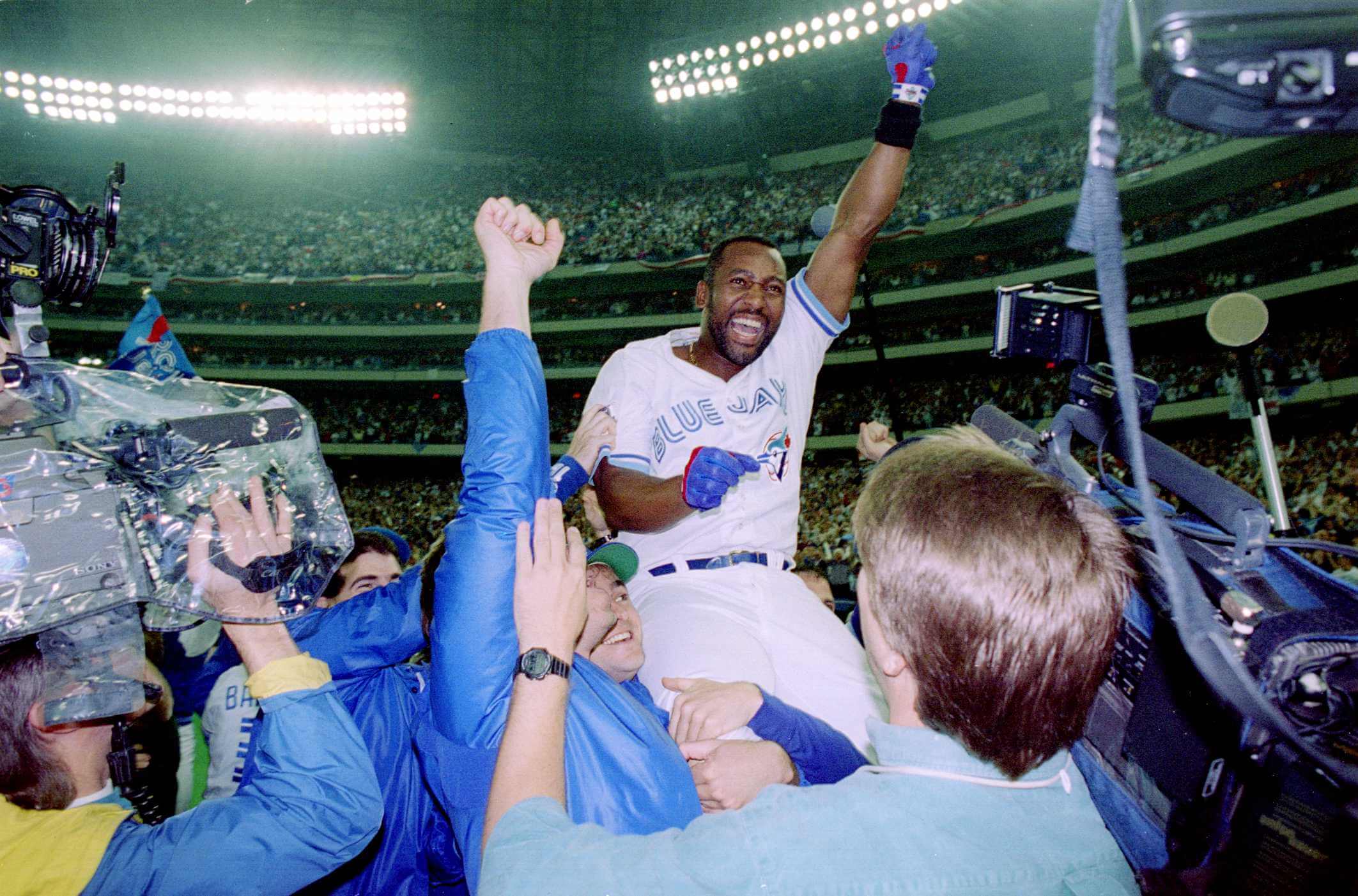
Joe Carter is carried by Blue Jays teammates after his walk-off to win the 1993 World Series gave Toronto back-to-back titles. (Rick Stewart / Getty Images)
But let’s keep offering more perspective. For most of modern baseball history, repeating has been pretty much a Yankees thing. They repeated in the 1920s … and ’30s … and ’50s … and ’60s … and ’70s. And you already know about the ’90s.
So do we really need to get into that part of this story? It’s well known. So let’s peel away all those Yankees teams. Now here are the only other repeaters you’re left with in the World Series era (1903-present):
• Joseph C. Carter’s 1992-93 Blue Jays
• Reginald Jackson’s 1972-73-74 Oakland A’s
• Bevo LeBourveau’s 1929-30 Philadelphia A’s
• George H. Ruth’s 1915-16 Red Sox
• Bris Lord’s 1910-11 Philadelphia A’s
And that’s a wrap for that list.
It’s impossible for these Dodgers not to know all about those 1992-93 Blue Jays. It couldn’t possibly be more fitting that this next great Blue Jays team is the last group standing in the Dodgers’ way, could it?
But when you peruse that list of other teams, it hits you. Other than those ’70s A’s teams, repeating was mostly a thing that happened when there were only eight teams in each league. It was a time before light bulbs, a time before TV cameras, a time when the only alert you could get on your phone was that bell that rang when grandpa called.
So now along come these Dodgers to crash this club? I know I volunteered to try to help these players grasp it, but they honestly need more than me. They need Michael J. Fox’s DeLorean. But like Freeman, his teammates aren’t ready to hop into that DeLorean yet.
“All we can think about is right now,” said infielder Miguel Rojas. “We have to stay focused on one day at a time and one pitch at a time. I think that’s the most important part right now, is to stay calm. If we do what we’re supposed to do in the next week, I might talk to you after that, and not be so humble about it. But it would be selfish for me to talk about a dynasty when we still have to win four games.”
I had many more conversations with these guys. I know many more fun facts on repeating. But let’s save them. If these Dodgers keep winning, we’ll lay out more of them for your masters degree in What It Means to Repeat. In the meantime, there are a few Weird and Wild things you need to know about Game 2 of this World Series.
Good Will hunting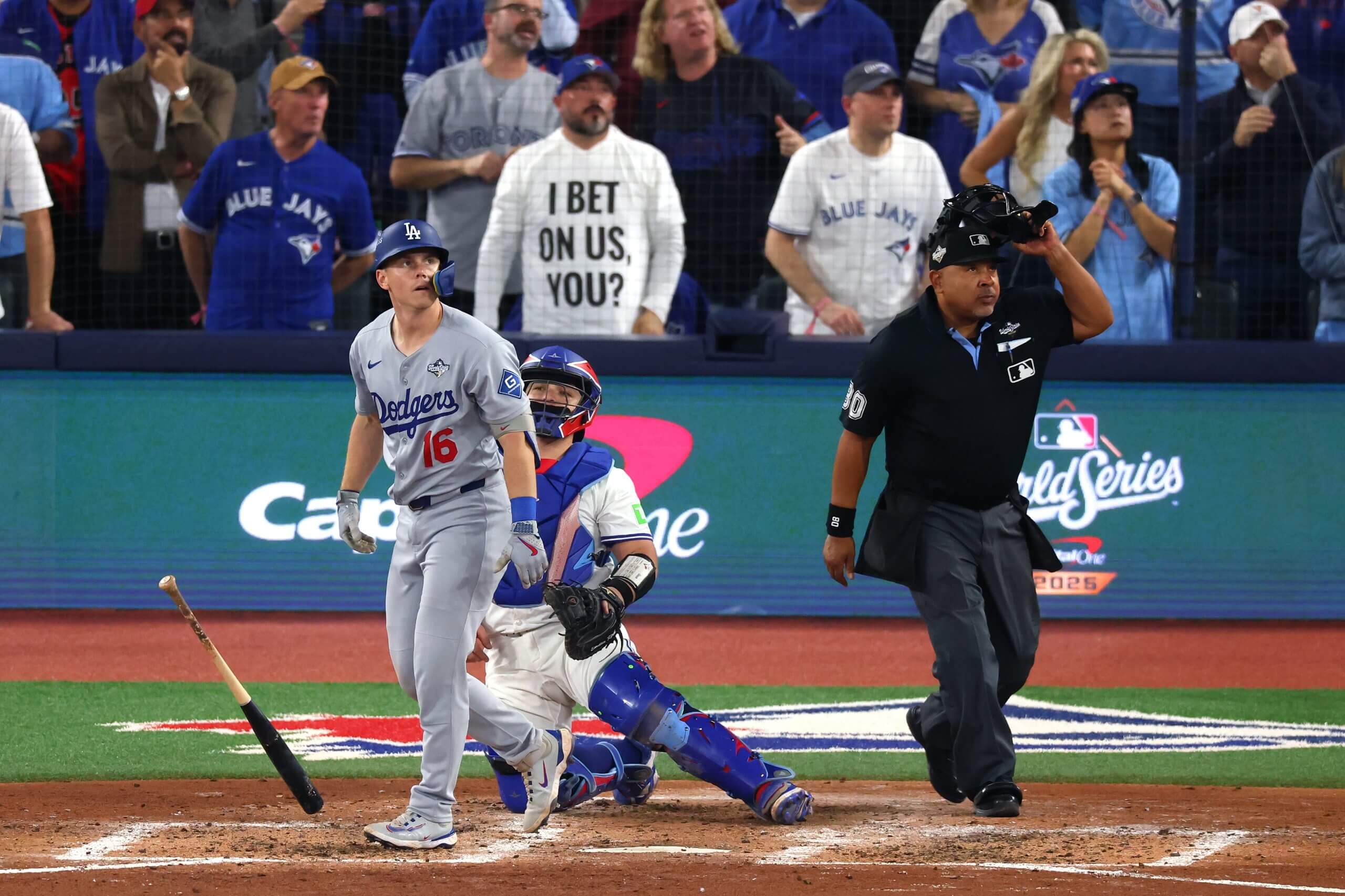
Will Smith watches his go-ahead, seventh-inning home run. (Gregory Shamus / Getty Images)
Dodgers catcher Will Smith made his debut on Planet Earth 20 years after Carlton Fisk’s legendary Game 6 homer in 1975 soared its way into World Series lore. So why are we bringing it up now? Because it’s time to connect those dots!
When Smith curled his own go-ahead homer around the left-field foul pole in the seventh inning Saturday night, for what turned out to be the winning run in Game 2, here’s what else he did:
He became the first catcher to launch a go-ahead World Series home run, in the seventh or later, for a team that was trailing in that World Series, since …
Right you are, since that Pudge Fisk special (in the 12th inning) in 1975.
In fact, according to Baseball Reference/Stathead, there have only been three home runs by a catcher that met that description in the history of the World Series: seventh inning or later, gave his team the lead, kept the team afloat in a series it was trailing. Here are those three.
PLAYER INNING WS GAMETRAILING IN SERIES
Will Smith
7th
2025, Game 2
1-game-0
Carlton Fisk
12th
1975, Game 6
3-games-2
Roy Campanella
8th
1953, Game 3
2-games-0
There have been five other go-ahead home runs thumped by catchers in the late innings of a World Series game through the years – most recently an extra-inning game-winner by the Phillies’ J.T. Realmuto in Game 1 of the 2022 Series. But all of those other homers were hit for teams in different circumstances. They were already either leading those World Series or at least even.
So Will, meet Pudge … and Campy. What a fun list.
A complete unknown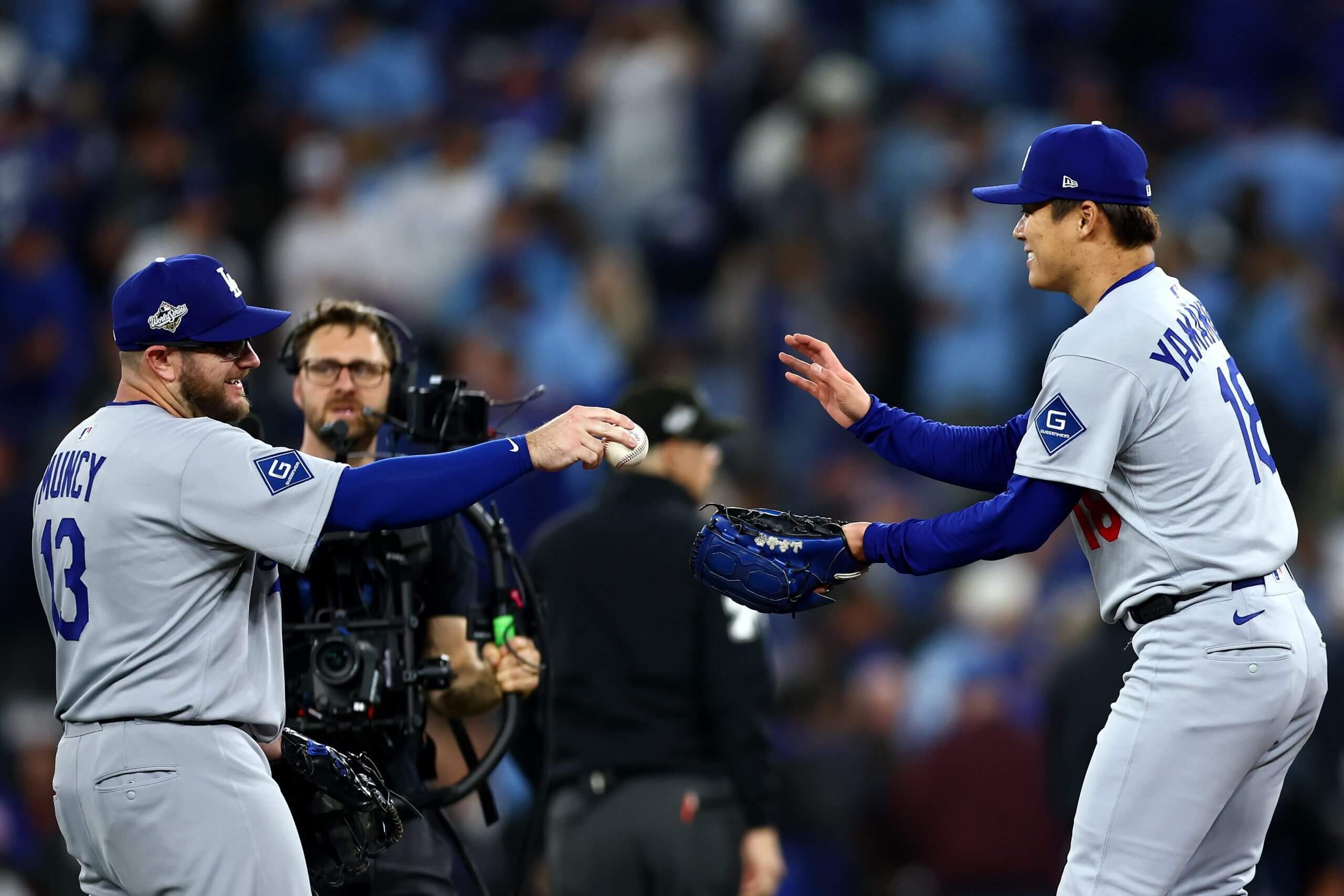
Complete dominance: Max Muncy hands the ball to Yoshinobu Yamamoto after the final out of Game 2. (Vaughn Ridley / Getty Images)
Once upon a time, pitchers dressed so fine and spun off October complete games as routinely as we pop our morning bagels into the toaster. Didn’t they? But this just in: It isn’t 1911 anymore.
So behold the October complete game magic of Yamamoto. He may not be starting a trend. But he’s doing something that matters massively to his team: He’s keeping the Dodgers’ bullpen from having to set foot on the nearest pitcher’s mound.
You think that isn’t a factor in Yamamoto’s cool little streak of back-to-back postseason complete games? Ha. You should have listened in as his teammate Clayton Kershaw was talking Saturday night.
Could other pitchers do this sort of thing — and actually pitch all nine innings? Of course they could, Kershaw said. But relief pitchers are so dominating these days, teams don’t see the need to ask them to do that.
He didn’t exactly spell out why the Dodgers are different from those teams at the moment. He just said: “The way Yosh is going and the way we’re built right now, we might let him throw 150 pitches if he wants.”
OK, they also might not. But here’s my personal favorite fun fact on Yamamoto’s back-to-back complete games.
Ready for the list of every pitcher in the last 100 years to win consecutive postseason complete games, both on the road, in the same postseason? Here goes:
Yamamoto, 2025 — Game 2, NLCS, and Game 2, World Series
Scott McGregor, 1979 — Game 4, ALCS, and Game 3, World Series
Hal Newhouser, 1945 — Games 5-7, World Series
Grover Cleveland Alexander, 1926 — Games 2-6, World Series
So after Saturday’s Game 2, that led to this fun exchange with Freeman, who’d just spent an enjoyable evening watching Yamamoto’s artistry from first base.
THE ATHLETIC: “So do you think this must be what it was like to play with Grover Cleveland Alexander?”
FREEMAN (laughing): “You know, when we go to Seattle, they always put stats like that in the clubhouse, and (I learned) there’s a guy that threw like 700 innings in like 1902.”
TA: “You mean Old Hoss (Radbourn)?” (Minor correction for Freddie: Old Hoss threw “only” 678 2/3 innings — in 1884, not in 1902.)
FREEMAN: “Right. Maybe we’ve got our own new Old Hoss.”
OK, probably not. But we can dream, can’t we — because you just can’t have enough new Old Hosses in …
Baseball!

